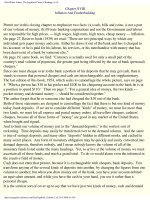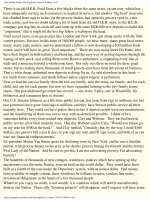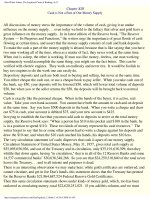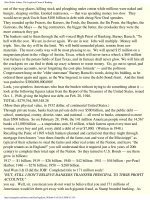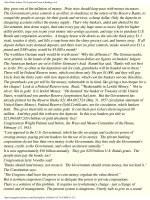The Legalized Crime of Banking and a constitutional remedy phần 6 doc
Bạn đang xem bản rút gọn của tài liệu. Xem và tải ngay bản đầy đủ của tài liệu tại đây (13.93 KB, 4 trang )
Silas Walter Adams, The Legalized Crime of Banking, ch 13
Chapter XIII
Cash is Not a Part of Our Money Supply
All discussions of money stress the importance of the volume of cash, giving it an undue
influence on the money supply. . . even today we hold to the fallacy that silver and gold have a
great influence on the money supply. In its latest edition of the Reserve book, "The Reserve
System — Its Purposes and Functions," the writers urge the importance of great floods of cash
flowing at certain times, and assert that the money supply consists of cash and bank deposits.
To make the cash a part of the money supply is absurd, because that is like saying that you have
two men working all of the time, when as a matter of fact, they never work at the same time.
When one is asleep, the other is working. If man was like money, tireless, one man working
continuously would accomplish the same thing, you might see the fact better. This can be
verified with electric engines. They work on endlessly and never tire. It would be foolish to
buy two engines to do the work one can easily do.
Depository deposits and cash are both used in buying and selling, but never at the same time.
You either cheque the cash out, or use a cheque book to pay seller. When you take cash out of
the bank, say $50, your deposits will be lowered $50, which will lower total volume of deposits
$50, but when you or the seller returns the $50, the deposits will be brought back to normal
volume.
Cash is exactly like the personal cheque. When in the hands of the buyer, it is active, real
value. Take your own bank account. You cannot have both the amount in cash and on deposit
at the same time. Say you have $500 deposits in the bank. When you write a cheque and draw
out $75 in cash, your account is debited $75, and your new account is $425.
In trying to establish the fact that you must add cash to deposits to arrive at the total money
supply, the Reserve book says: "When a person has $10 in his pocket and $100 in the bank, he
is in a position to spend $110. These two kinds of money represent his cash resources." The
writer forgot to say that he or some other person had to write a cheque against his deposits and
draw the $10 out; and when the $10 cash reached his hands, his deposits were $10 less.
The very circulation statement (of cash) disproves that cash is apart of our money supply.
Circulation Statement of United States Money, May 31, 1957, gives total cash supply at
$55,095,658,926, and out of the Treasury and in circulation, only $35,191,638,399; then they
whittle that down again, having "in circulation," that is in all of the 12 Reserve Banks and some
14,537 commercial banks" $30,636,348,266. So you see that $24,259,310,640 of the total never
leaves the Treasury. . . and to all intents and purposes is dead.
There is an interesting observation we may make here: while gold certificates are outlawed, and
cannot circulate, and get in Joe Doe's hands, this statement shows that the Treasury has printed
for the Reserve Banks $21,964,687,524 Federal Reserve Gold Certificates.
Then this same circulation statement shows under kinds of money gold, which, too has been
outlawed as circulating money, total $22,620,251,821. If you add this column, and we must
(1 of 9)5.4.2006 9:14:05
Silas Walter Adams, The Legalized Crime of Banking, ch 13
admit that every item listed is "money" (when in circulation), you find that the
grand
total is
$79,457,122,476. That indicates that we have just lying around, not active, dead,
$48,620,774,190, about $18 billion more than the banks find use for in the circulation of money.
It is interesting to note that in 1934, on the insistence of the Reserve folks that we go off the
gold standard, take gold coin and gold certificates out of circulation; then raise the price of gold
from $20.67 an ounce to $35 an ounce; then buy up all of the gold in sight, the Treasury, not the
Reserve authorities paying for it; that now we find that those Reserve boys' Midas hands have
gripped Uncle Sam's throat, compelling him to print at no cash outlay to them over $21 billion
Federal Reserve Gold Certificates) which gives them title to the gold Uncle Sam bought, and
spends millions guarding as if it were a sacred cow. And it is a sacred cow to scheming bankers.
Why print the gold certificates if they cannot circulate? They can't even reach a commercial
bank; they lie in the treasury, another police risk, and doing the people not one bit of good. It is
merely some of that gobbledegook bankers peddle. If they base bank deposits on Corporation
stock, why do they want Gold Certificates?
Well, from absurdity to absurdity you travel if you follow the mysterious trail the bankers blaze
for you when they dare to talk.
Since either a cheque or cash must be used by the buyer in paying for a purchase, then they are
identical, and not by any stretch of the imagination can be made separate monetary funds. The
only volume of money is reflected, or would be if all deposits were reported in the bank
statements, in total deposits (all deposits ) in all the banks of the nation. These deposits are used
in buying and selling, or should be, and whether the seller takes your cheque, or whether you
cheque the cash out and hand it to him, is immaterial. The fact remains, as admitted by the
Reserve book, that someone must write a cheque and present it to his bank, before cash can
leave the bank. And when you leave the bank with $10 you just drew out, your deposits are
debited $10.
I bought an American Express Company's $10 travellers cheque, a few days ago that I might
photograph it for use in this story. It cost me 50 cents, or I had to add 50 cents to a Reserve $10
note, to get this American Express Company's $10 travellers cheque. So the cheque seems to be
better money than Reserve notes. For the same reason I bought an express money order, and a
postal money order, again paying a high tariff for the exchange.
Then if we must add to the bank deposits the volume of cash in the treasury and the banks arrive
at a total volume of money; we should as the total of all companies' travellers and money orders,
also total p.o. money orders, to arrive at a grand total, for these are just as good money as
Reserve notes or silver certificates, as for that matter. The same as with personal with personal
checks . . . . good when signed and presented to seller.
You never saw a report of postage stamps in the post offices, total amount, and volume, etc.
The postage stamps have no value until taken out, and Uncle Sam is paid for them, not when he
sends them to the post-offices.
Had you ever thought that banks do not lend their capital, nor surplus, nor undivided profits, nor
(2 of 9)5.4.2006 9:14:05
Silas Walter Adams, The Legalized Crime of Banking, ch 13
the cash in their vaults, and that they never report their deposit credits? That when you read a
bank statement appearing in your papers, that it tells little or nothing about the true business of
banking? A teller in a bank brought to my office once, the bank statement which the
Government requires must be printed periodically, and when he handed it to me, he remarked:
"I don't see why those statements are printed. Nobody understands them, and they don't reveal
half the banks do.
So my dear fellow victims, it matters not how many billions of dollars in cash may be minted
and printed, the only "cash" available to you is the amount of your deposits. You ordinarily will
pay with a cheque, but when you do not, you chequed the money out of the bank, and the check
just did it work before you made the purchases.
I have gone to this length to prove to you that the cash should not be added to the volume of
deposits in all banks, to arrive at the volume of money in the Nation. There is no relationship
between volume of cash and volume of deposits. Cash is provided for your convenience as
cheques are provided, that you may trade your deposits for goods. Your cheque is not good
until you sign it; the cash is not good until you draw it out of the bank. As with postage stamps,
the amount or volume minted and printed is of no importance, beyond having an ample supply
or volume to meet the demands of the people.
Cash (coin and bills) is nothing in the world but tokens, having one advantage over personal
cheques, and that is it will be received without question by all sellers, and does not have to be
signed. Cash is a general cheque, and like all cheques, of no value until in your possession.
If Congress would compel all banks to report all funds (deposits and cash) on their books,
additional width would have to be given the deposit totals, for it would run into the trillions of
dollars.
The cry the bankers make is that their system is the only way a flexible and fluid money may be
provided in times of business high activities. When the Government takes over the keeping of
the people's deposit credits, cashes and clears their cheques, Congress will see that the volume
of Depository Credits is ample to meet the highest business demands; and when business is
slack, the surplus deposits, like cash in the vaults, will just lie there and slumber until some
phase of the moon sets the people about new and frenzied enterprises, as since World War II,
but under the Depository System there will not be high and low business activities-normal,
steady, purposeful progress at all times. The gamblers, create cycles of low and high activity;
and bankers are gamblers!
Honest, legitimate enterprises, and industries, and businesses will never lack funds under the
Depository system; for that will be the constant responsibility of Congress, to see that the
volume of deposits is adequate at all times; and there will be no "pumping in and siphoning off"
as now practiced by banks. There will be no indebtedness requiring siphoning money off that
debt may be foreclosed. When people are rushing ahead building, developing, advancing as in
the early 50's, the Congress would not grow alarmed about the luxuries the people were
enjoying; it would not, as the 19 Reserve men did in 1955, stop the pumps, which had been
pumping money into the people's pockets; and turn to the exhaust pumps and begin frantically
(3 of 9)5.4.2006 9:14:05
Silas Walter Adams, The Legalized Crime of Banking, ch 13
siphoning (pumping) the money out.
Don't let them frighten you by saying that there will be no money for advancement,
improvement if we stop them. They now plead for lower income taxes that they may "save
funds" for expansion and development — never using them for expansion, always, issuing more
corporation stock! If they are only using profits for expansion, the banks serve them no
purpose. As we need more money, Congress will order the Treasury to give the Government
deposit credits for the needed additional amount. This will be chequed out for expenses of the
Government, and flow right into the deposits of the people. It would be a creative act, but an act
only Congress can Constitutionally perform, and it would benefit every person in the Nation,
because it would save taxes, as the money would first pay Government costs.
That is what we do under the Reserve System, add new deposits to the credit of the
Government; but the bankers do a lot more: they require Uncle Sam to issue bonds to amount of
new deposits, say $100 billion, which the people must pay taxes to pay the interest on these
bonds and still owe the bonds. So under the Depository system, there would be no bonds, no
debt to private corporations, no taxes to pay interest.
And remember this: under the Depository system, new deposits would be created at rare
intervals, and then by an act of the Congress; but under the present Reserve system, every time
the commercial, or Reserve Banks, make a loan or buy an investment obligation, they create the
face of the loan or purchase in
new
deposits, which find their way into the total volume of all
bank deposits. That sum is, so stupendous that I don't think the banks will try to amass them,
total them. . . or maybe that is what they have done, and when the 19 men who meet tri-weekly
in New York to puzzle over the banking business, saw that stupendous total, it scared the wits
out of them, and they at once stopped the pumps pumping deposits into the deposit totals, and
hastily started to siphon it out of the hands of the average man.
They did this in 1955, and gradually economic paralysis is extending over the entire economic
body. Building is off, manufacturers are finding their goods mounting with no one to buy, men
are now walking the streets looking for a job. . . men are always anxious to work; and only a
cold-blooded corporation would sit and squeeze money out of their pockets by making jobs
scarce because money is shut off.
Yes, the Depository system will dry up this flood of new deposits pouring in daily; but the
Congress would see to it that the body would always have adequate blood in its arteries. And
inasmuch as both cash in the vaults and deposits are dormant, and have no influence on the
deposits and cash circulating, we arrive at the conclusion that only the active money affects
industry, business, our economy.
There might be too much deposits in the volume on the books of the Depositories, but there
would never be too little to meet an legitimate enterprises of the Nation. I have just received
through the mails an expensively engraved formal announcement of the "formal opening of their
newest H.E.B. Food Store." There is an engraved picture of this "store," which covers several
thousand feet of floor space; and there have been paved thousands of feet of parking space for
customers' cars. The whole covers approximately four blocks.
(4 of 9)5.4.2006 9:14:05


